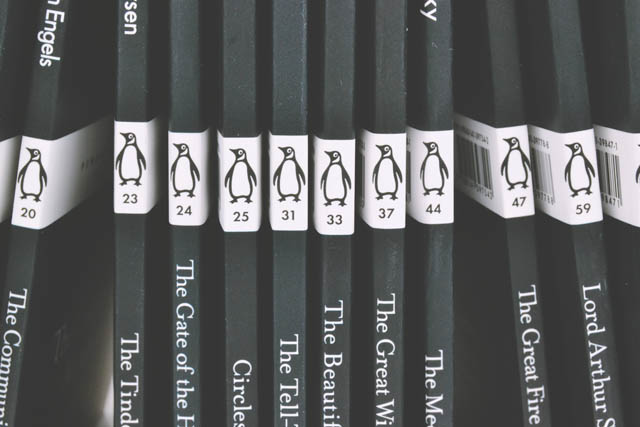Little Black Classics
As a bibliophile, one of my favorite moments of the year comes around each May. This is when, while preparing for our family to travel and rest in June and July, I’ll assemble my “summer stack”– the books I’ll read my way through over the summer.
There are a few informal rules I follow: I try to read in a few different genres. I try to keep company with both the dead and the living. I try to include one piece of long, classic literature every year. As our family compared calendars and made plans, I stacked the books.

But then, the newest issue of The New Yorker turned up in my mailbox, and I happened on Jill Lepore’s essay “In Case of Emergency, Break Open A Book.” In it, the journalist and Harvard professor describes the experience of reading, day by day, through Penguin’s Little Black Classics series of portable, thin-line book selections. Lepore begins this to break her habit of doomscrolling through the day’s scandals before bed at night.
The collection curates selections of fiction, history, poetry, essays, and more from around the world and across history. And its assembled collection of voices — women and men, drawn from every corner of the world, from our own century to the deep recesses of history — is a picture of the import of reading widely.
Reading Promiscuously

The 17th century English Puritan John Milton once wrote a pamphlet in which he advocated for the freedom of the press. In it, he argues for the immeasurable value of “books promiscuously read.” It’s safe to assume in recommending “promiscuous” reading, Milton wasn’t making the case for the steamy-grocery-store-romance-novel. He was, rather, commending a wide array of reading. For Milton, maintaining a healthy, varied literary diet helped Christians cultivate virtue and forsake vice in their lives.
When I listen to a poet tell me the truth about love or death, or a novelist depict the wonder of an unfolding human life, or a historian bear witness to the tragedies or victories that shape the course of the world, virtues like humility, wisdom, and empathy can start to put down roots in my mind and imagination. My view of the world is stretched and complicated. Life reveals itself to be more beautiful, more terrible, more interesting than I’d assumed.
What the essayist Joseph Epstein, in A Literary Education, observes about the novelist is, to my mind, true whether I’m reading fiction or theology, classic epic or modern biography: “The novelist says to the reader: things are not as simple as you think. . . life is more surprising, bizarre, fascinating, complex, and rich than any shibboleth, concept, or theory used to explain it.”

So, I’m revising my summer stack. This summer, I’m going to take what I’m calling the “Lepore Challenge”: I’m going to read my way through as many of the Little Black Classics as I can. Some are selections by authors I’ve already encountered: Melville, Dostoyevsky, Poe. But many others are voices I haven’t yet heard, like the Persian poet Hafez, or the ethnographer Mary Kingsley, or the Greek writer C.P. Cavafy.
Who knows? Maybe a summer of promiscuous reading will cultivate a bit more wisdom, or a bit less hubris, than I currently have. Maybe I’ll be less attached to what I thought I knew. Maybe even more enthralled with life and the One who creates and redeems it.


3 Responses
Thanks for the timely prompt here, Jared.
” …less attached to what I thought I knew.” In this recent environment of library and university and news-outlet and research defunding/censoring, it would seem wise to consider the underlying question here. Would God have us be humble truth-seekers or suppressive truth-insisters? Did Jesus and the prophets challenge those who voiced questions or those who insisted on answers? Does not every person have the right to tell their own story? And to have others read it? Does freedom now mean the loudest and most threatening voices decide truth?
Dear Penguin,
Wait, what?! There’s a series of similarly bound books that look really cool and I really should have read them already? You are a razor blade salesman and/or crack dealer. I am at your mercy. 😉
Love,
Jon.
P.S. My TBR pile curses you. 😉
Jared, let us know at the end of the summer what you have read and what it has meant.
We’d like to know.